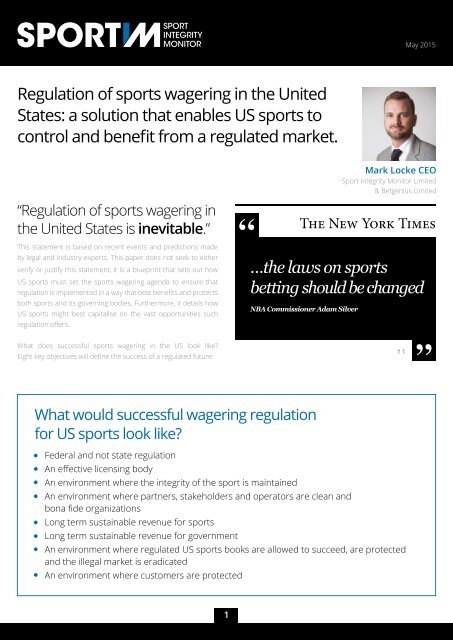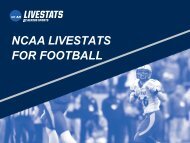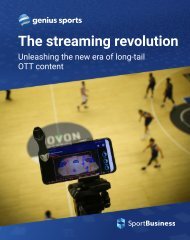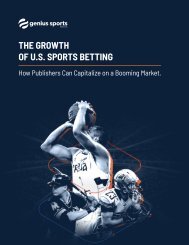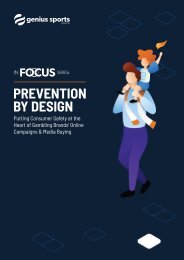Mark Whitepaper May 2015
You also want an ePaper? Increase the reach of your titles
YUMPU automatically turns print PDFs into web optimized ePapers that Google loves.
<strong>May</strong> <strong>2015</strong><br />
Regulation of sports wagering in the United<br />
States: a solution that enables US sports to<br />
control and benefit from a regulated market.<br />
<strong>Mark</strong> Locke CEO<br />
Sport Integrity Monitor Limited<br />
& Betgenius Limited<br />
“Regulation of sports wagering in<br />
the United States is inevitable.”<br />
This statement is based on recent events and predictions made<br />
by legal and industry experts. This paper does not seek to either<br />
verify or justify this statement, it is a blueprint that sets out how<br />
US sports must set the sports wagering agenda to ensure that<br />
regulation is implemented in a way that best benefits and protects<br />
both sports and its governing bodies. Furthermore, it details how<br />
US sports might best capitalise on the vast opportunities such<br />
regulation offers.<br />
“<br />
The New York Times<br />
…the laws on sports<br />
betting should be changed<br />
NBA Commissioner Adam Silver<br />
What does successful sports wagering in the US look like?<br />
Eight key objectives will define the success of a regulated future:<br />
† 1<br />
“<br />
What would successful wagering regulation<br />
for US sports look like?<br />
Federal and not state regulation<br />
An effective licensing body<br />
An environment where the integrity of the sport is maintained<br />
An environment where partners, stakeholders and operators are clean and<br />
bona fide organizations<br />
Long term sustainable revenue for sports<br />
Long term sustainable revenue for government<br />
An environment where regulated US sports books are allowed to succeed, are protected<br />
and the illegal market is eradicated<br />
An environment where customers are protected<br />
1
Why US sports should lead the way<br />
† 2<br />
ILLEGAL<br />
$380<br />
BILLION<br />
REGULATED<br />
$3.45<br />
BILLION<br />
The opportunity<br />
The opportunity for US sports to benefit from regulation of<br />
wagering activity is entirely unique and not mirrored anywhere else<br />
in the world. The US sports market is dominated by the NBA, NFL,<br />
MLB, NHL and NCAA, who collectively control an enormous<br />
share of the national sporting interest and, more importantly, an<br />
estimated 80% of the wagering undertaken by US customers is<br />
made on these US sports.<br />
Without the events that these organizations provide, popular<br />
sports wagering in the US cannot exist. This gives US sports the<br />
potential to have control over wagering that is unrecognisable<br />
from other sports overseas – where the governance of those<br />
sports varies enormously.<br />
“<br />
The Washington Post<br />
We need a debate in<br />
Congress...<br />
Sen. John McCain on sports betting<br />
† 3<br />
“<br />
It is for this reason that the US market opportunity is unique and<br />
why US Sports bodies should act now to secure their future.<br />
2
<strong>May</strong> <strong>2015</strong><br />
Why US sports should act now<br />
US sports should act today to support a regulated model that works<br />
best for US sports. The following sections outline how this can<br />
be achieved.<br />
Back a federal approach<br />
Only a federal approach would successfully shut out the<br />
unregulated offshore sports books. A state by state solution or any<br />
other approach would leave the door open for these unregulated<br />
entities and their suppliers to continue to target unregulated<br />
states where illegal gambling would continue.<br />
“<br />
...do it the right way<br />
and go through<br />
Congress.<br />
Dan Spillane<br />
NBA Vice President & Assistant General Counsel<br />
It is only a federal approach and the resulting national framework<br />
that will secure the three critical requirements: integrity,<br />
transparency and protection of US customers.<br />
† 4<br />
“<br />
What should a successful licensing regime include?<br />
Probity test for operators and their supply chain<br />
Clear regulatory framework for payments to sports and tax obligations<br />
Robust enforcement against illegal operators, including advertising bans<br />
Central reporting and distribution hub that is integrated into all sports, operators<br />
and the IRS<br />
Complete transparency on wagering and customer behaviour<br />
Mandatory use of official sports data controlled by the sports<br />
Customer protection measures (know your customer, prevention of underage gambling<br />
and combating match fixing)<br />
Anti-money laundering and fraud prevention<br />
3
The integrity of sports<br />
Without sporting integrity the key principles of<br />
sports are undermined and the fair competition<br />
within sports cannot exist. The vast amount of<br />
money wagered on US sports in the illegal market<br />
threatens that integrity<br />
This threat means that US sports should be doing everything<br />
that it can immediately to understand and protect the integrity<br />
of their events.<br />
Once regulation is in place, all officially sanctioned data and<br />
wagers placed with licensed US operators would pass through<br />
a centralized technology hub. This would allow all wagers to<br />
be time stamped and validated and wagering activity would be<br />
monitored on a second by second basis, with any anomalies<br />
identified in real time monitoring of wagering patterns. Sharing<br />
of that information with regulators and US sports via the hub<br />
would be a mandatory licence condition.<br />
Control and regulation of wagering activity by regulators and<br />
US sports would mean clear visibility on wagering activity taking<br />
place on US sports in the US. This is a key advantage over the<br />
currently unregulated model which exists completely out of<br />
sight of regulators and US sports. Enhanced control and total<br />
transparency would be a major weapon in the fight to maintain<br />
sports integrity and keep out corruption. Information received<br />
could be used within new technologies to monitor wagering<br />
activity. These technologies use sophisticated analytics to<br />
identify wagering anomalies in real time.<br />
Information must be backed by investigation. In a regulated<br />
framework, US sports would be supported to thoroughly<br />
investigate any wagering anomalies and minimize corruption.<br />
This opportunity does not exist currently as US sports are<br />
unable to see the wagering activity taking place on the sports<br />
that they control.<br />
These robust integrity measures would ensure that the sports<br />
on which customers wager remain beyond reproach, and that<br />
public confidence in sporting contests remains unchallenged.<br />
Are your partners fit & proper?<br />
Many companies working within the global wagering market have<br />
an apparently legitimate background, however, once analyzed in<br />
detail will often have a questionable history based on the position<br />
they have taken against sports bodies, as well as the operators<br />
they have chosen to supply.<br />
For example, the unregulated US wagering market is targeted by a<br />
number of illegal operators. It is not only them but their supposedly<br />
legitimate suppliers, based outside the US who between them<br />
benefit greatly from exploiting the illegal US market. It is vital that<br />
US sports know their supplying partners and ensure that they<br />
have maintained a clean track record when it comes to future<br />
regulation and compliance in the US and elsewhere.<br />
Other areas of caution include international operators, especially<br />
wagering exchanges where gamblers bet against other gamblers<br />
and the exchange takes commission on every wager. These are<br />
often legitimate wagering operators, however their business model<br />
means they do not have the best interests of sports at their core.<br />
In fact, for this reason they often facilitate corruption by allowing<br />
wagering on sporting events that other sports wagering operators<br />
have long since ceased to offer due to integrity concerns.<br />
A key objective of robust regulation is the<br />
eradication of the illegal sports wagering market<br />
While the existence of an attractive regulated offering will diminish<br />
demand for the ilegal market, it must be backed by strong<br />
enforcement of the rules. Otherwise a key incentive for wagering<br />
operators to obtain a US license will be lost.<br />
Stamping out the illegal market does not just mean targeting<br />
the sports books themselves, it means targeting the suppliers of<br />
lines and data, and other essential suppliers that allow them to<br />
operate.<br />
US regulated operators should be prohibited from partnering with<br />
any unregulated sports book or data suppliers that have served<br />
them – and any such entity should be prevented from taking any<br />
US business.<br />
4
<strong>May</strong> <strong>2015</strong><br />
Sustainable revenue for sports<br />
US licensed wagering operators would be legally obliged to<br />
make a financial contribution directly to US sports. However, this<br />
contribution comes with a responsibility on the part of US sports<br />
to provide regulated operators with a superior product. This would<br />
take the form of official data, that is the best available to drive<br />
sports wagering and that is not made available to unregulated<br />
operators. In addition, a balance must be struck to ensure that<br />
the contribution required of regulated operators still allows them<br />
to be commercially successful in a competitive market.<br />
Even a small contribution from regulated<br />
operators would generate billions of dollars<br />
of revenue for sports.<br />
The benefits to US sports in participating in gambling revenue<br />
are obvious. This gives US sports an opportunity to divert funds<br />
back into their sports by embarking on ambitious investment<br />
programmes for the benefit of sports.<br />
A punitive percentage of wagering profit being taken by<br />
government will arguably hinder US licensed operators’ ability<br />
to compete with their unregulated (non-tax paying) rivals. If<br />
revenue and profits are too diminished, wagering operators will<br />
be deterred from becoming licensed which clearly defeats the key<br />
aim of countering the illegal market – so a balance must be struck.<br />
Nonetheless, a proportionate tax rate would obviously bring huge<br />
revenues into government which would be coupled with countless<br />
job opportunities and other associated economic benefits created<br />
in the newly regulated wagering market.<br />
If the US were to adopt a rate of taxation in line<br />
with the United Kingdom (15% of net revenue),<br />
based on industry estimates of the unregulated<br />
market government revenue from sports<br />
gambling would be $57 billion.<br />
† 2.1<br />
In addition, US sports will also be able to fund and support a powerful<br />
integrity campaign including an education program, monitoring<br />
and investigation to ensure that corruption is permanently shut<br />
out of US sports. This increased spending power will strengthen<br />
US sports’ control and maintain and enhance the image and status<br />
of their sports both nationally and internationally.<br />
Sustainable revenue<br />
for Government<br />
Protecting US customers<br />
With regulation comes consumer protection and responsible<br />
operations. Regulated sports wagering in the US should be a<br />
legitimate leisure activity which means that those taking part<br />
should be protected. To achieve this aim, conditions of licensing<br />
should include strict player protection requirements such as<br />
age verification, ‘know your customer’ measures and combating<br />
match fixing.<br />
Wagering profit would be taxed by Federal Government and as is<br />
the case with the contribution to US sports, the key consideration<br />
in getting this right is balance.<br />
5<br />
7
Eradicating the illegal market<br />
For a regulated model to succeed against the existing illegal market<br />
it must be the most attractive proposition for wagering operators<br />
and US customers alike. For this to happen, the regulated<br />
offering, meaning the wagering product offered by operators to<br />
US customers, must be superior to any offering accessible via an<br />
unregulated route. This can be achieved by the US sports having<br />
an obligation to provide regulated operators with data products<br />
and services that are the best in the market and are not available<br />
elsewhere.<br />
To achieve these goals, US sports need to create a market<br />
leading data product that cannot be provided by anyone else.<br />
It must be the fastest, the most accurate and the most available.<br />
Every advantage should be<br />
taken of new technologies to<br />
leverage the US<br />
sports’ unique position<br />
of control to create<br />
an unrivalled offering<br />
for licensed operators<br />
to use. In addition,<br />
licensed operators must<br />
be regulated and<br />
licensed in such a way to<br />
ensure that they offer<br />
the most user-friendly,<br />
† 5<br />
safe and enjoyable product.<br />
It must be the only product that US customers want to use. In<br />
addition, regulated operators must be allowed the considerable advantage<br />
of marketing their own services and illegal operators must be<br />
prohibited from doing so.<br />
Ultimately, market forces supported by effective and robust regulation<br />
is the only sure-fire way to make a regulated model a success<br />
and to eradicate the illegal operators.<br />
In summary<br />
Regulation is inevitable; US sports must seize the opportunity now<br />
to make that regulation work for them. As this paper outlines,<br />
US sports need to create a regulated framework that ensures<br />
regulated operators will have a huge starting advantage over their<br />
unregulated rivals and shuts down the illegal market. This would<br />
acheive the fundamental aims of maintaining integrity, protecting<br />
US customers and creating revenue for sport and government.<br />
This thought piece presents a model for a<br />
newly regulated wagering market that would<br />
primarily exist for the good of sports – a model<br />
and an opportunity that currently does not exist<br />
anywhere else in the world.<br />
Copyright © <strong>2015</strong> Sport Integrity Monitor Limited<br />
† 1 Adam Silver<br />
http://www.nytimes.com/2014/11/14/opinion/nba-commissioner-adam-silverlegalize-sports-betting.html?_r=1<br />
† 2 & 2.1 The National Gambling Impact Study Commission estimated that up to $380<br />
billion is wagered illegally each year in the United States. American Gaming industry<br />
report that regulated sports betting in Nevada totalled $3.45 billion in 2012. It is safe<br />
to assume that the size of the unregulated betting market in the United States has<br />
grown significantly in recent years and that research today would result in higher<br />
estimates.<br />
http://www.americangaming.org/industry-resources/research/fact-sheets/<br />
sports-wagering<br />
NATIONAL GAMBLING IMPACT STUDY COMMISSION FINAL Report at 2-14<br />
http://govinfo.library.unt.edu/ngisc/reports/2.pdf<br />
† 3 Sen. John McCain<br />
http://www.washingtonpost.com/blogs/early-lead/wp/<strong>2015</strong>/02/02/sen-johnmccain-says-congress-needs-to-re-examine-u-s-ban-on-sports-gambling/<br />
† 4 Dan Spillane<br />
GiGse Conference <strong>2015</strong><br />
†5 ESPN<br />
ESPN The Magazine - February 16, <strong>2015</strong><br />
6
<strong>May</strong> <strong>2015</strong><br />
Sport Integrity Monitor works with sports governing bodies and<br />
sports betting operators to prevent and manage the integrity<br />
concerns associated with match fixing and betting related<br />
corruption.<br />
By providing the full range of betting integrity services (consultancy,<br />
education and prevention programmes, technology based wager<br />
monitoring systems and investigations) Sport Integrity Monitor has<br />
become a valuable partner for sports bodies seeking to protect<br />
their competitions from corruption.<br />
Sport Integrity Monitor draws on over 15 years’ experience in the<br />
sports betting industry, working with both sports governing bodies<br />
and betting operators to provide effective measures to protect<br />
betting markets and sports events from corruption. It has never<br />
worked with nor derived revenue from any US facing operator and<br />
continues to operate a zero tolerence approch to parnerships with<br />
illegal operators.<br />
Sport Integrity Monitor works with several of the largest<br />
international sports bodies including the English Premier League<br />
and the Football Association.<br />
For more information on Sport Integrity Monitor and our services<br />
please feel free to contact:<br />
<strong>Mark</strong> Locke<br />
Email : mark.locke@sportim.com<br />
Cell : +44 7796 171 959<br />
7
Sport Integrity Monitor Limited<br />
25a Soho Square,<br />
London,<br />
W1D 4FA<br />
Call us on +44 207 851 4070<br />
www.sportim.com<br />
Sport Integrity Monitor Limited is a subsidiary of Betgenius Limited.


